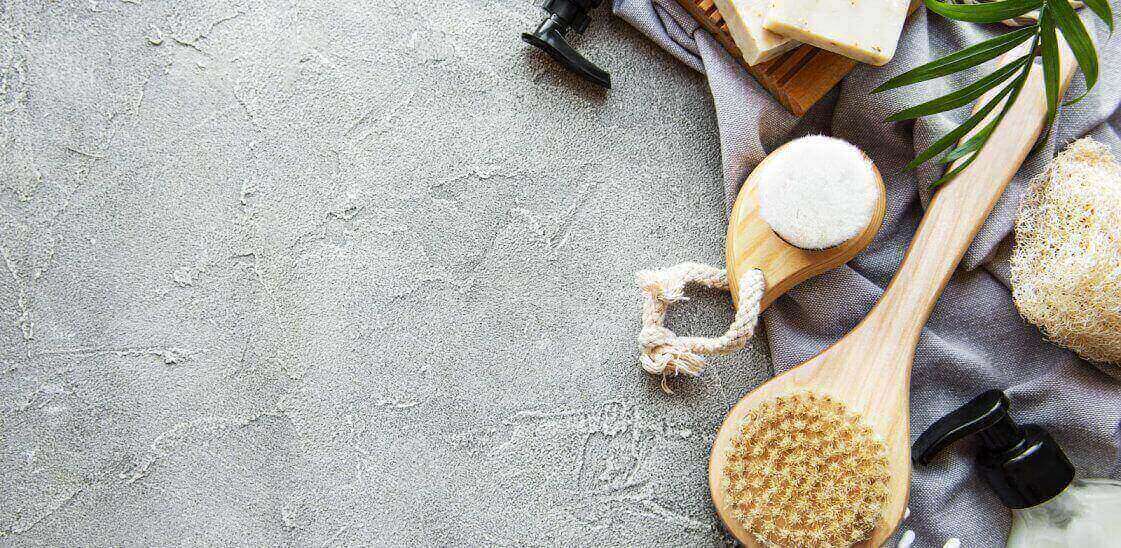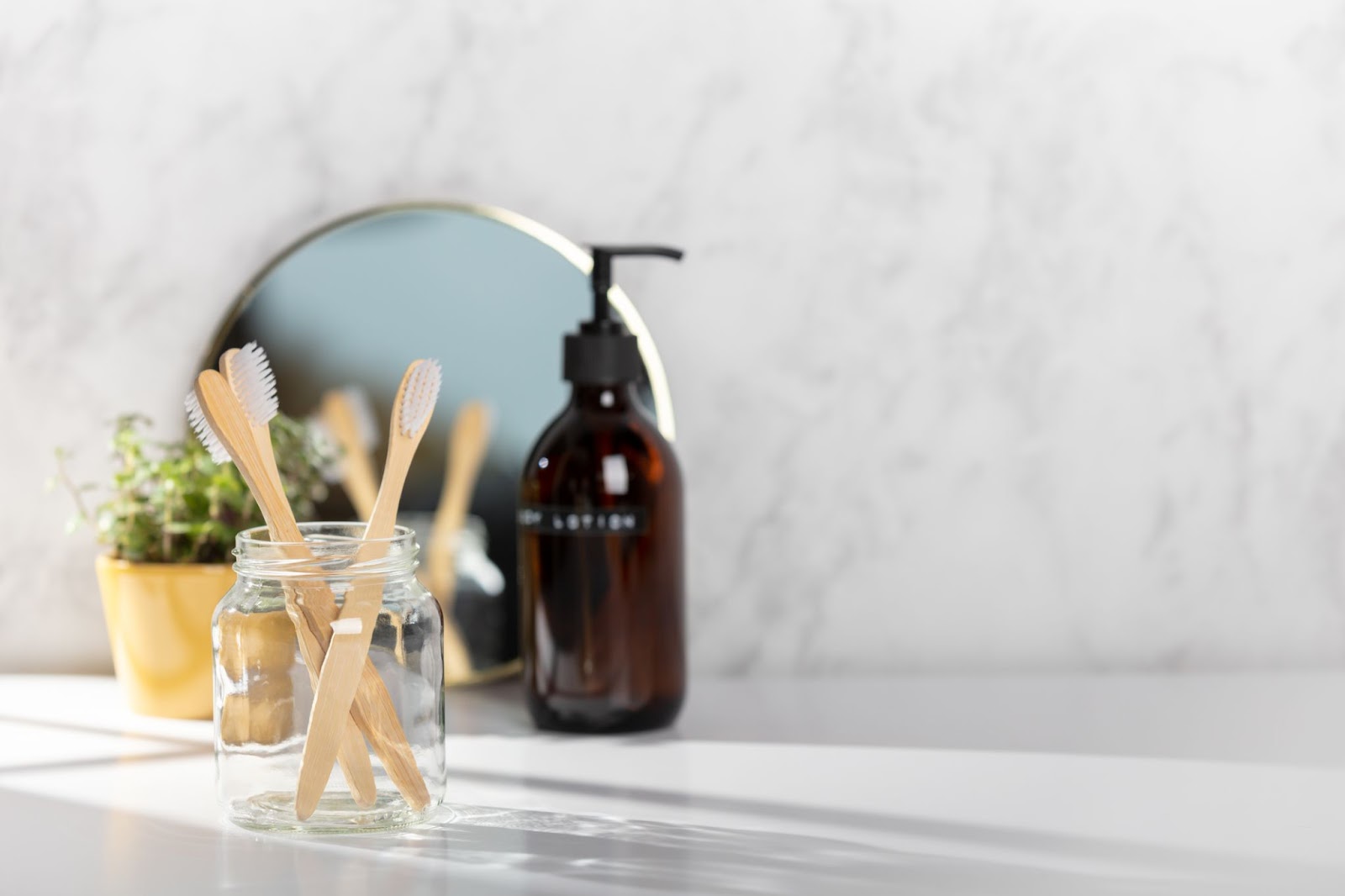
How to go plastic free in the bathroom
Many of us are now very aware of how our plastic usage is affecting the planet. Photos and videos of sea animals stuck in can rings or with plastic straws causing them injury are all over our social media feeds. It’s no wonder that so many people are looking for ways to reduce their plastic usage, and one of the best places to start is the bathroom.
How to reduce your plastic footprint
You may not realise it, but your bathroom is probably full of plastic products, mainly in bottle form like soap, shampoo, body wash, toothpaste, cleaning products and more. Then there’s the cotton buds, baby wipes and sanitary products too. Yep, our bathrooms are full of plastic. While not all plastics are bad, we wanted to discuss just some of the ways you can reduce this material in your bathroom to be more environmentally friendly.
- Switch to eco dental products
Plastic has been the main material used in toothbrushes, floss picks, interdental brushes and more. Now, other materials can be used to replace it, including plant-based bio resin and birch wood.
Here at DenTek, we’re aiming to reduce the production of single-use plastics by investing in sustainable teeth cleaning products. We now have a ‘Sustainability’ section on our website that’s full of eco-friendly items, including eco floss picks and birch wood interdental brushes. The packaging is 100 per cent plastic free and recyclable too.
Our Eco Cross Flosser and Triple Clean floss picks are now available in bio-resin form, a material made from sugar cane plants. Using this renewable material reduces carbon emissions by up to 80 per cent when compared to plastic creation. But the additional good news is that the floss picks are just as effective as their plastic counterparts.
We’ve also made plastic-free interdental brushes too, as they’re now made from sustainable birch wood. Birch wood is a climate-positive material, meaning it helps to remove additional carbon dioxide from the atmosphere. Furthermore, the brushes are reusable, vegan friendly and remove just as much plaque and food particles as the plastic equivalents.
Another eco-friendly dental product to try is a bamboo toothbrush. The handles are completely biodegradable and can even be put on a compost heap. It’s thought that around 150 million plastic toothbrushes are thrown away in the UK each year, all of which will take decades to break down, before becoming microplastics that will likely live in the sea for even longer.
It’s not just your toothbrush you could consider swapping either, but your toothpaste. Toothpaste tubes are made predominantly from plastic and so you may wish to swap to toothpaste tablets instead, which use significantly less plastic.
Are interdental brushes reusable?
Interdental brushes, whether they’re made from plastic or birch wood, are absolutely reusable, just like your toothbrush is. The good news is that birch wood ones can be reused up to three times or disposed of when worn down.
- Use shampoo bars
It’s likely that many people still purchase shampoo that comes as a liquid/gel form inside a plastic bottle. This has been the industry norm for many years, but now shampoo bars are stepping up.
Shampoo bars usually come in a cardboard box, so there’s absolutely no plastic packaging. Much like any bar of soap, the shampoo can be lathered up by rubbing the bar in your hands and then applying to your head. These products tend to have fewer chemicals and last longer due to their reduced water content, making them all-round better for the planet.
And it’s not just shampoo that comes in bar form, but hand soap, body wash, face wash, shaving foam and deodorant do too. If every person swapped out all of these products for the solid bar alternative, a huge amount of unnecessary plastic could be saved.
- Refill glass bottles with liquid soap
If you’re not quite ready to swap out all your products for bars, you could buy refills that can be decanted into glass bottles instead. Not only do glass bottles look nice, they’re practical and very easy to keep clean.
Many brands now offer refills as an option, and some products may be bought in large five litre tubs that can be recycled when they’re empty. Cleaning items could be bought in much the same way too.

- Choose reusable sanitary products
Many women still use disposable pads and tampons and according to City to Sea, these items are the fifth most common item found on European beaches, more popular than disposable coffee cups, straws or cutlery. In fact, the average woman goes through around 10,000 disposable menstrual products in her lifetime.
If you can, it could be a good idea to make a switch to reusable pads, period pants or menstrual cups. All of these can be reused multiple times and washed ready for when they’re needed again.
- Make use of bamboo cotton pads and buds
Cotton buds and pads are essential in many bathrooms, used for cleaning our ears and face or removing makeup. While cotton pads are generally made from cotton, some of them do contain synthetic plastic fibres and it takes a huge amount of water to produce enough cotton for just a few pads, making them unsustainable. The same goes for the cotton tips on the cotton bud, but the stick itself is often made from plastic.
Both of these can be switched for more eco-friendly varieties. Some cotton bud varieties are now made from bamboo, making them biodegradable and can be thrown into a compost or food bin.
As we’ve already mentioned, cotton isn’t a sustainable material because of the huge amount of water (and pesticides) it takes to create it. Then there’s the fact that they’re usually packaged in plastic. Instead, bamboo pads are made from bamboo fibres and can be washed in the washing machine. This means they can be reused many times and will come in a bamboo bag too, removing the need for plastic altogether.
- Swap to a reusable razor
Shaving is likely a major part of your beauty routine, whether you’re neatening your beard or getting rid of your leg hair. Many razors available on the market are predominantly made from plastic and can only be used a handful of times before going blunt.
Where possible, you should look into buying metal razors that give you the option to change out the head when it goes blunt. This means you keep the handle of the device, never really needing to throw it out, and simply replace the blades themselves. It could make a small difference to your bathroom waste and is cheaper, too.
There are so many ways you can reduce plastic waste in your bathroom. Even if you feel like you can’t do all of these things straight away, putting just a couple into practice would be a great start.




